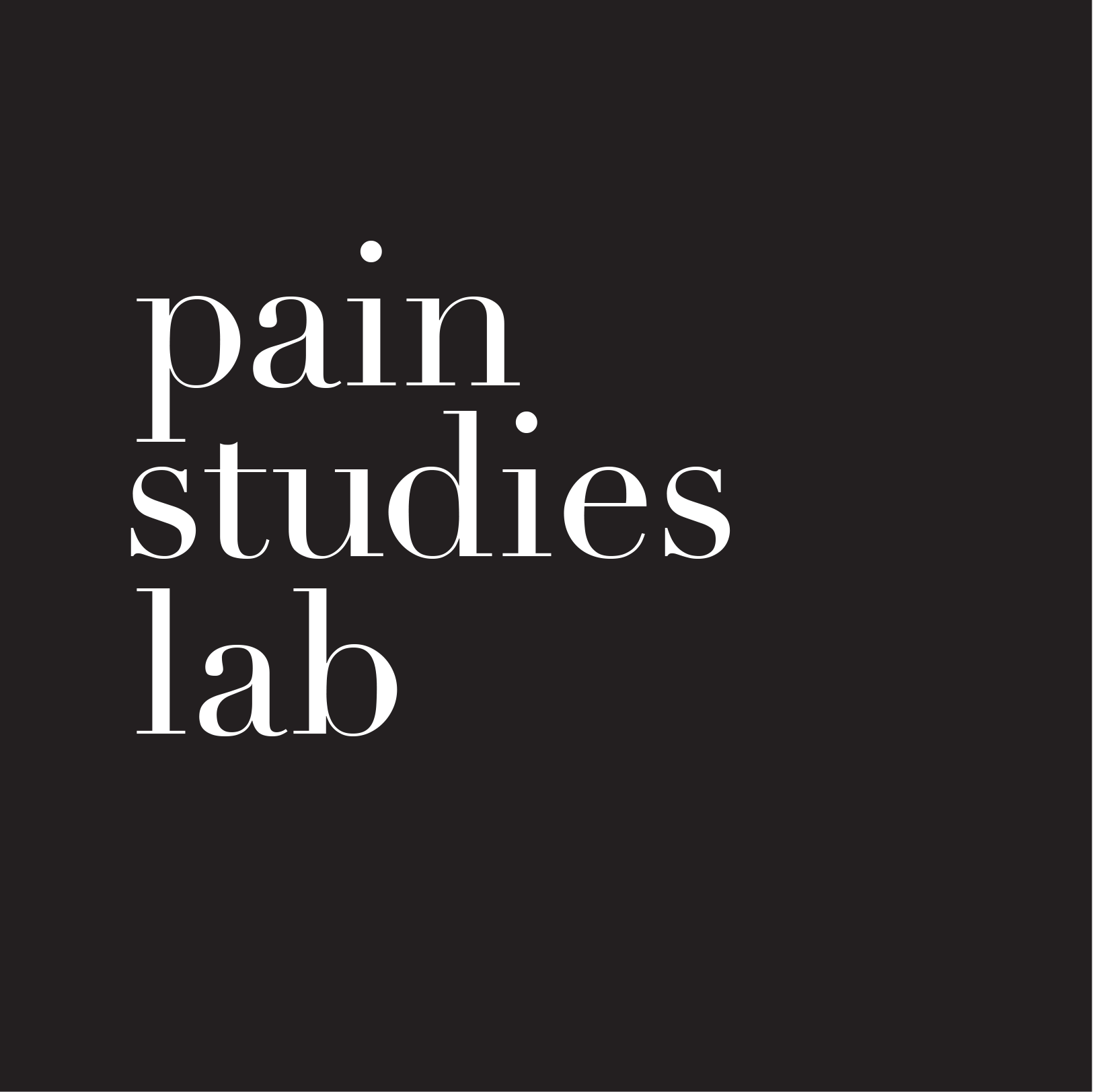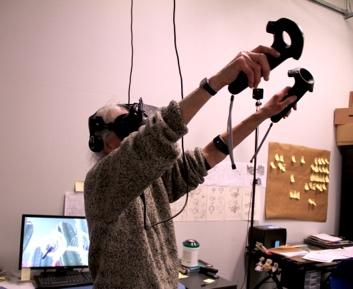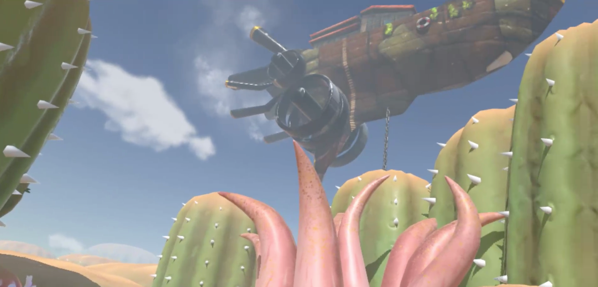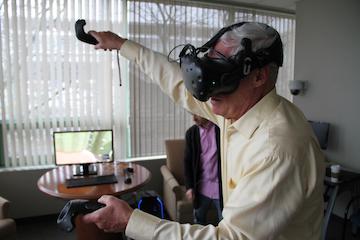On Sept 2-7, 2019, members of the Pain Studies Lab presented 5 posters at PAINWeek 2019, Las Vegas. PAINWeek is a multidisciplinary conference for frontline clinicians focusing on pain management.
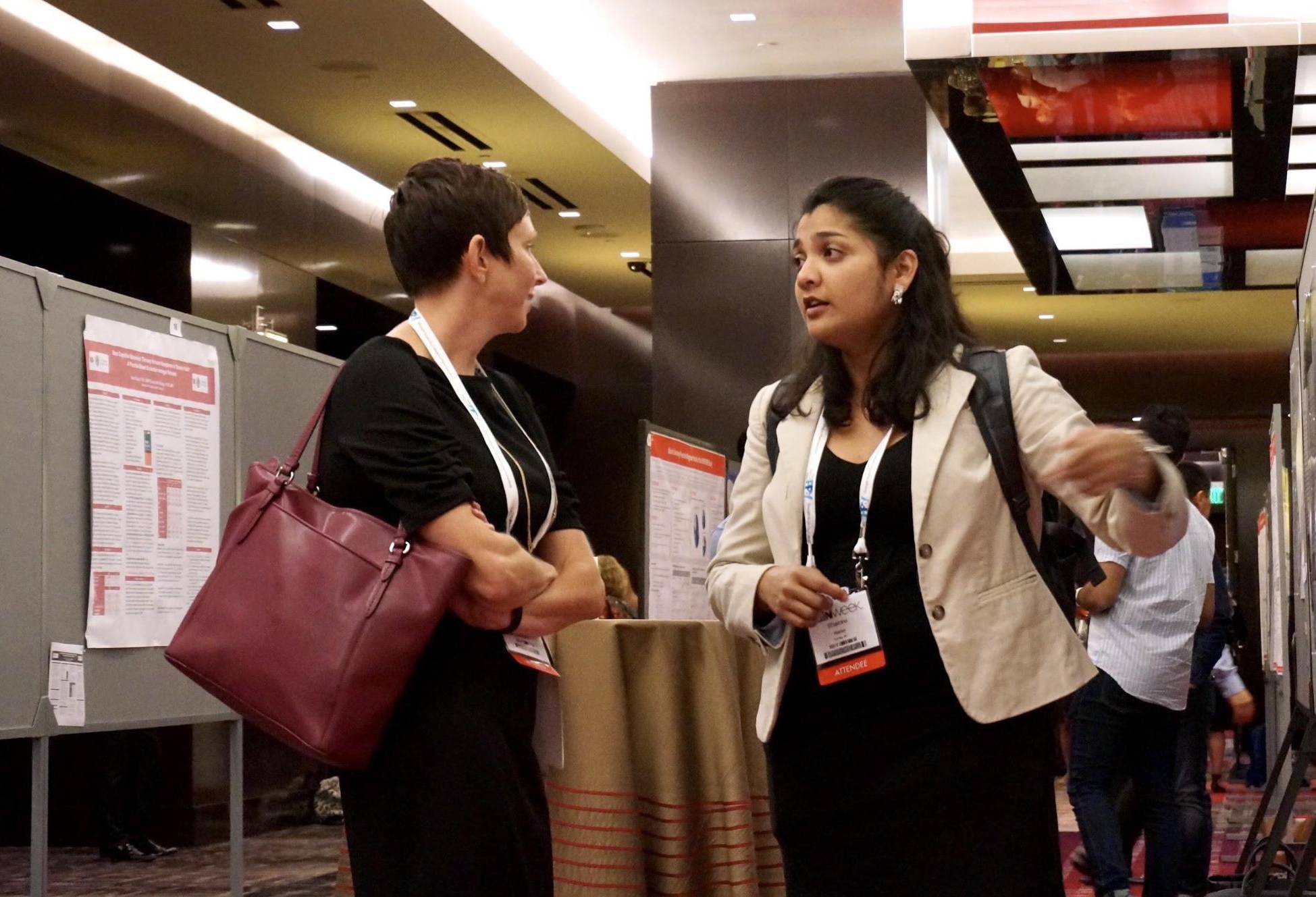
PhD student Bhairavi Warke discusses results of the Pain Studies Lab’s research to a PAINWeek 2019 attendee.
Each poster articulates the results of our scientific and clinical studies. Many of these studies are with our long-time collaborators at the Arthritis Research Centre of Canada (ARC) and the BC Support Unit, and use cutting-edge design know-how and interactive and/or immersive technology newly built for helping patients with chronic conditions. The research studies that each poster describes is affiliated with a Pain Studies Lab project:
As-If
The aim of this Virtual Reality (VR) platform is to raise empathy of aging people who live with chronic pain. In this VR game, a player “inhabits” a full-size 3D character or “avatar,” a grandmother who is struggling to accomplish everyday tasks. Players must strive to accomplish these tasks “as” this character. As they do so, their physical range of motion is restricted as their arm and wrist joints become red, and they hear the aging grandmother’s inner self-talk.
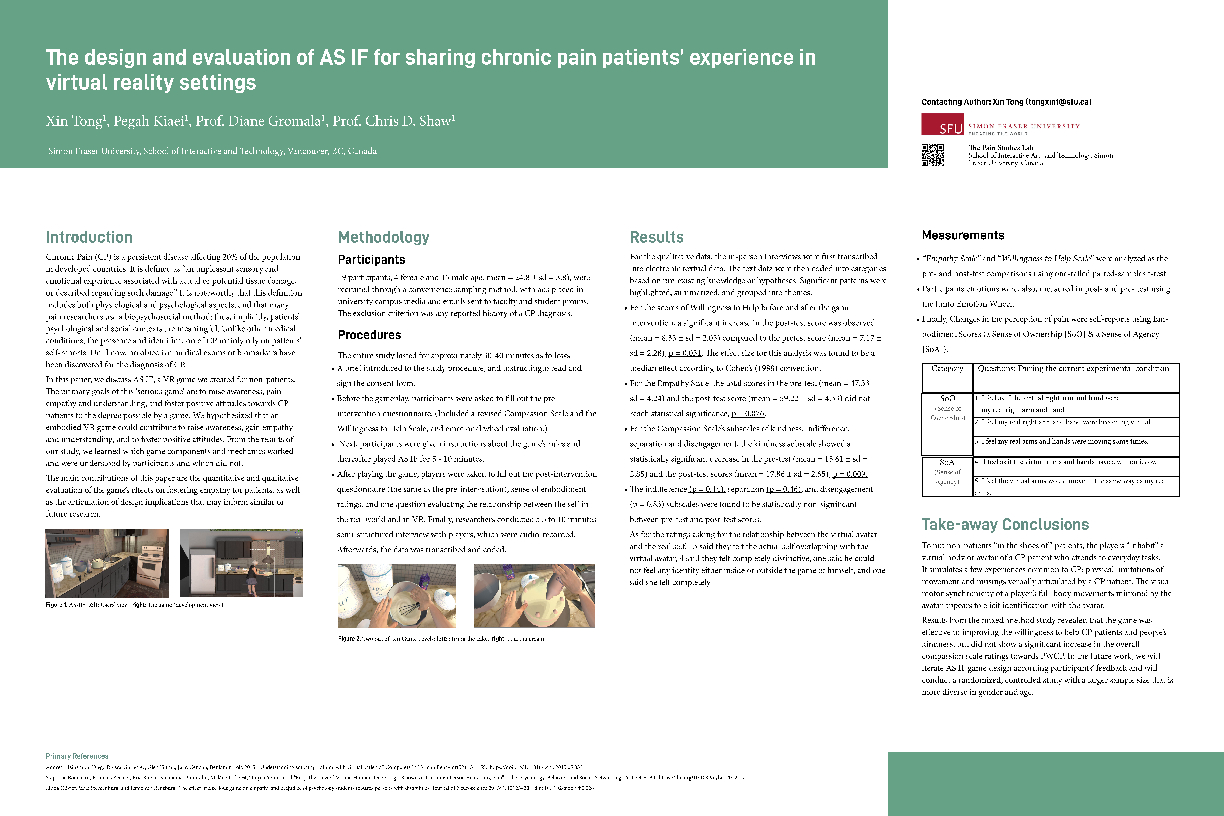
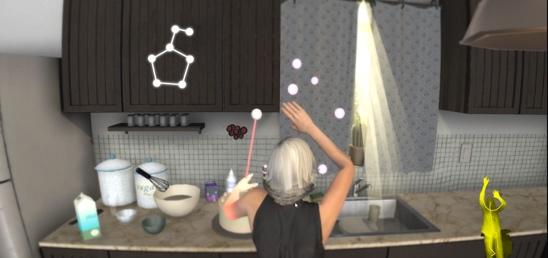
Players in the VR game As If “inhabit” the avatar of an aging chronic pain patient. From this first-person perspective, they try to perform everyday tasks as if they were that patient. The goal is to motivate empathy for chronic pain patients. After much testing, the initial version evolved into the VR version.
Tong X, Kiaei P, Gromala D, Shaw C. The Design and Evaluation of AS IF for Sharing Chronic Pain Patients’ Experience in VR Settings, PAINWeek Abstract Book 2019. Postgraduate Medicine. 2019 Sep 1; 131(sup1), 21. doi:10.1080/00325481.2019.1655695
LumaPath
This VR game is intended to promote Range of Motion (RoM) exercises for aging chronic pain patients with Rheumatoid Arthritis (RA) or Osteoarthritis (OA). In a pilot study, patients were unaware that the range of motion gameplay in LumaPath conferred about 30% aerobic benefit. The older the patient, the higher the aerobic benefit.
Initially, the designers weren’t sure why aging adults were so enthusiastic about this steampunk-styled VR game until patients remarked that LumaPath’s ship bears a strong resemblance to the Beatles’ Yellow Submarine of their youth.
Tong X, Gromala D, Pam S, Kim D. A Serious Immersive Virtual Reality Game for Promoting Chronic Arthritis Pain Patients’ Physical Activity and Range of Motion, PAINWeek Abstract Book 2019. Postgraduate Medicine. 2019 Sep 1; 131(sup1), 19-20. doi:10.1080/00325481.2019.1655695
Tong X, Machuca F, Feng N, Gromala D, Li L, Aceves-Sepulveda G. Promoting Physical Activity and Movement for Arthritis Patients through a Virtual Reality Game, PAINWeek Abstract Book 2019. Postgraduate Medicine. 2019 Sep1;131(sup1), 120-121. doi:10.1080/00325481.2019.1655695
The Burden of Pain Symptoms
In a collaborative project, researchers from ARC, the BioV Lab and the Pain Studies Lab explored what “Citizen Science” might mean in health domains. Instead of asking people to count birds or measure water levels, the researchers considered engaging ways that citizens of British Columbia in Canada might share their pain symptoms, and how they would ensure that such data was anonymized and kept private and secure. Next, they partnered with Tactica Interactive to design and build a public health data-hub. The protoype web portal was tested “in the wild,” and is scheduled to launch in spring 2020.
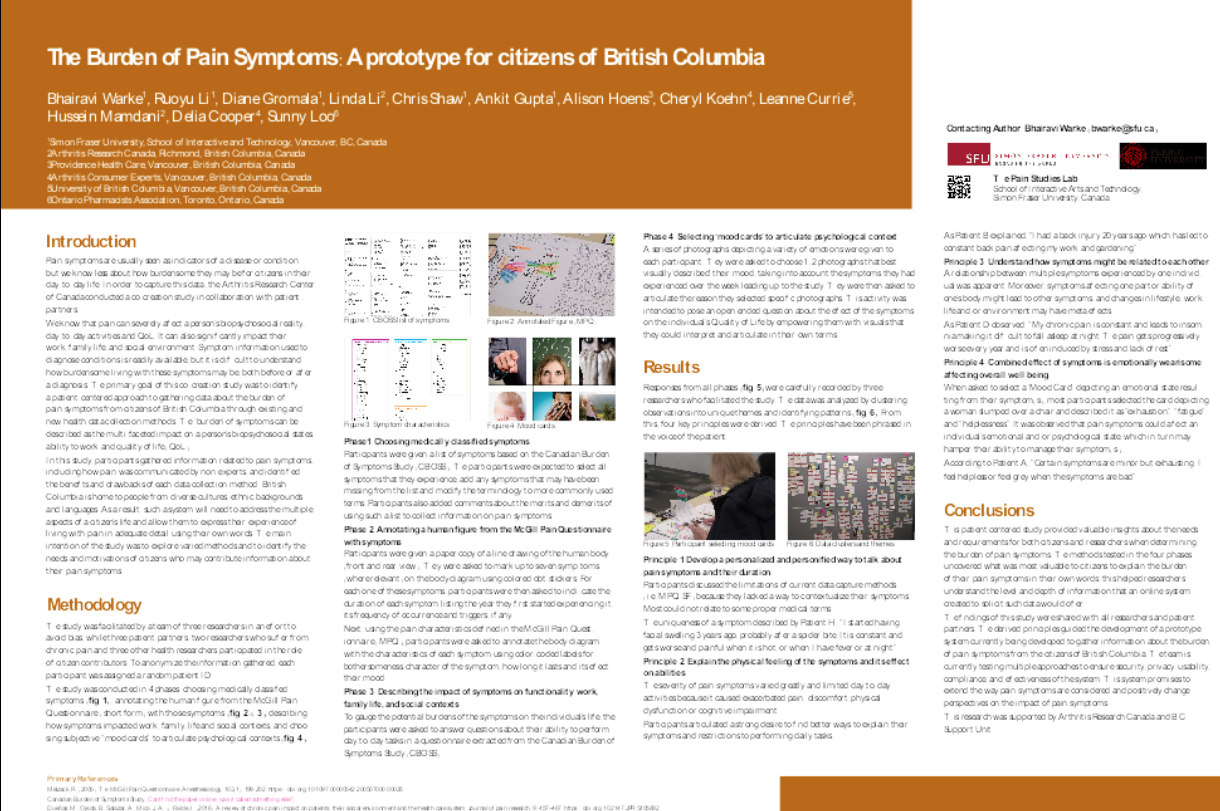
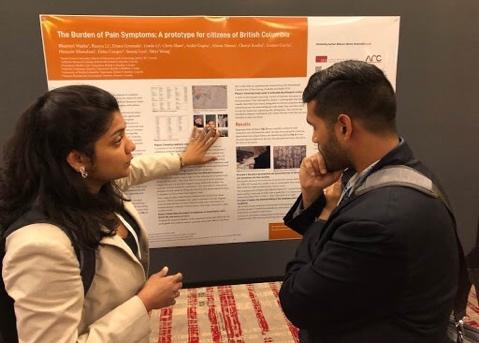
Bhairavi Warke discusses an innovative new ‘citizen science’ project with an attendee at PAINWeek 2019 in Las Vegas.
Warke B, Li R, Gromala D, Li L, Shaw C, Gupta A, Hoens A, Koehn C, Currie L, Mamdani H, Cooper D, Loo S. The Burden of Pain Symptoms: A prototype for citizens of British Columbia, PAINWeek Abstract Book 2019. Postgraduate Medicine. 2019 Sep 1; 131(sup1): 10–11. doi:10.1080/00325481.2019.1655695
The Virtual Meditative Walk
This immersive VR system incorporates bio-sensors and its Vocal Coach teaches chronic pain patients to learn Mindfulness-based Stress Reduction (MBSR), a well-validated method that has long been used to help chronic pain patients manage their long-term pain. The benefit of this VR system is the biosensors provide real-time feedback so patients know if their efforts are indeed having observable effects on their mind and body. Pain Studies Lab researchers are now looking at its potential long-term neurological benefits.
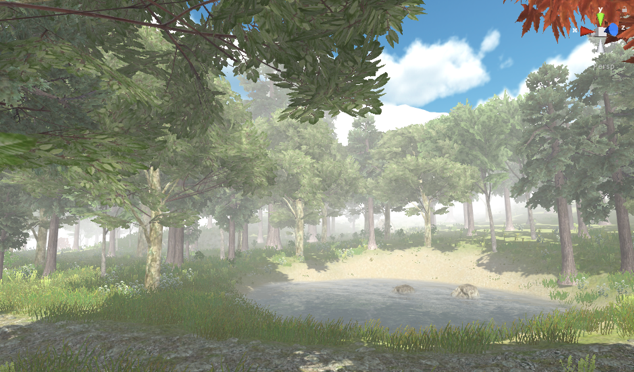
In the Virtual Meditative Walk, as patients reduce their stress levels by focusing on their inner states — like their heartrate and breathing — they see and hear changes in the “weather”: fog and clouds gradually disappear, and birds and insects become more active in the virtual forest.
Li R, Warke B, Gromala D, Garrett B, Taverner T. Does Immersive Virtual Reality Modulate Chronic Pain: A Longitudinal Study Design, PAINWeek Abstract Book 2019. Postgraduate Medicine. 2019 Sep 1; 131(sup1), 20–21. doi:10.1080/00325481.2019.1655695
FitViz
In collaboration with ARC, researchers from SFU’s BioV Lab created and clinically tested FitViz, an app that uses a FitbitTM to help patients with Rheumatoid Arthritis (RA) and Osteoarthritis (OA) and physiotherapists to track & monitor their physical activity levels.
FitViz also determines and recommends the frequency and exercise level for individual patients, termed “bouts.” In this way, patients can get a sense of how much exercise is best for their specific needs and can monitor their own progress, while their physiotherapists can follow and adjust their recommendations.
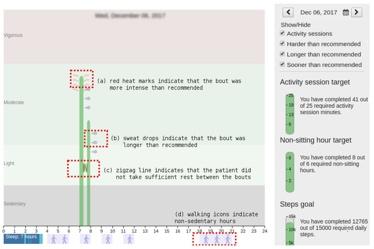
Tong X, Heng T, Gupta A, Shaw C, Gromala D, Li L. FitViz-Ad: A Non-Intrusive Reminder to Support and Encourage Rheumatoid Arthritis Patients with Physical Activity, PAINWeek Abstract Book 2019. Postgraduate Medicine. 2019 Sep 1; 131(sup1), 121-122. doi:10.1080/00325481.2019.1655695
The Pain Studies Lab’s researchers also presented results of VR studies that lab member Xin Tong conducted over several months in Beijing:
- A study among participants in Beijing exploring body ownership, sense of agency and heat pain perception using VR and Leap MotionTM sensors.
Tong X, Diao H, Gromala D, Wei K. Exploration of Body Ownership, Agency and Heat Pain Perception in Virtual Reality (VR), PAINWeek Abstract Book 2019. Postgraduate Medicine. 2019 Sep 1; 131(sup1), 19. doi:10.1080/00325481.2019.1655695
The research results that lab members presented raised interest among the attendees, many of whom are pain clinicians and some researchers from laboratories and pain research institutes across the U.S.
upcoming
The Canadian Pain Society’s (CPS) Annual Scientific Conference 2020 will feature AS IF, and recent research results will also be shown at the International Association for the Study of Pain’s (IASP) upcoming conference this summer in Amsterdam.
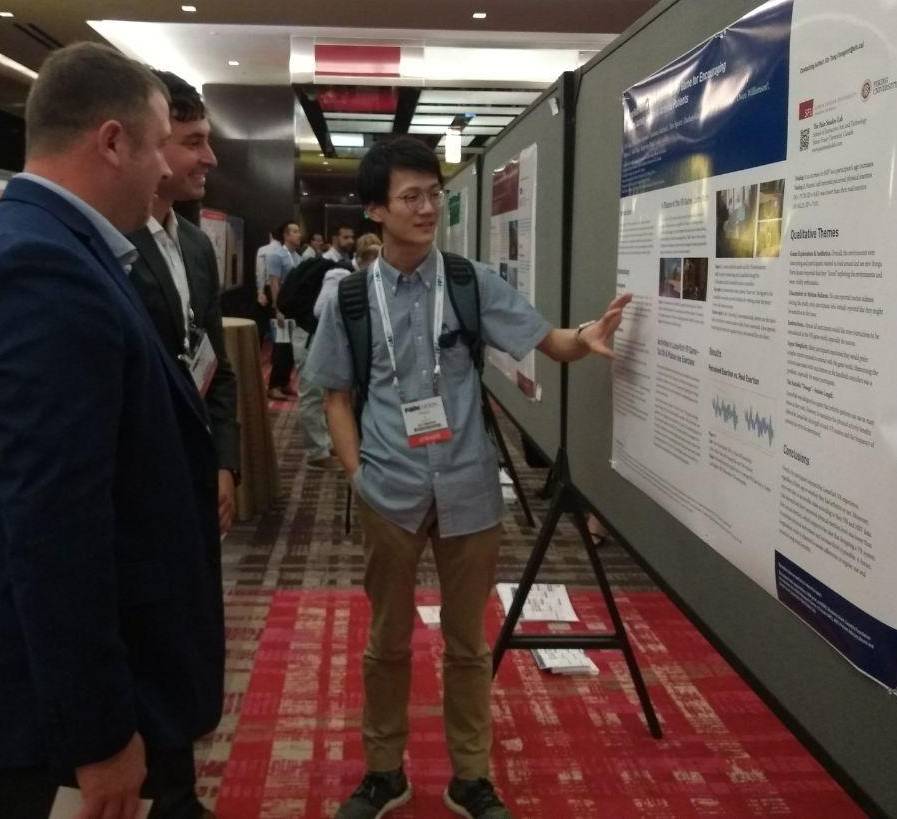
At PAINWeek 2019, graduate student Ruoyu (Gary) Li explains our longitudinal VR “dosage” study design for chronic pain patients who used VR in their homes three times per week, at a minimum.
